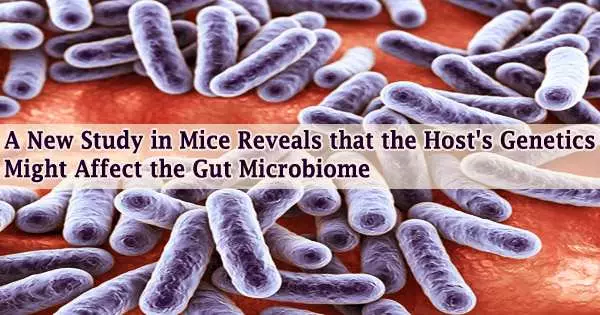According to scientists, your gut microbiome the bacterial community that inhabits your digestive system can be influenced by your genes in addition to your diet and environment.
Researchers from the UK and Germany who studied the microbiomes of house mice discovered that many species of gut bacteria were heritable from one generation to the next, and that the genetic makeup of the mouse host had a substantial impact on this composition. Additionally, they discovered proof that the mice that these microorganisms live on evolve and diversify with them.
They examined the relationships between the gut microbiome and genes connected to human diseases, such as Inflammatory Bowel Disease (IBD), and discovered that these genes were in fact grouped in the regions of the genome linked to the composition of the gut microbiome.
The researchers evaluated the profusion of gut bacteria present in hybrid mouse strains and examined the connections between the diversity of the microorganisms and the genetics of their mouse hosts in a study published in the journal eLife.
It’s interesting to note that they discovered that bacteria known to co-diversify across mammalian hosts were more likely to be inherited, which raises the possibility of co-evolution with these specific species.
House mouse hybrids, which are more genetically diverse than their laboratory-bred relatives, were studied by the team of scientists from the Section for Evolutionary Medicine at Kiel University and the Max Planck Institute for Evolutionary Biology (MPI-EB) in Plön, led by Professor John Baines. Dr. Leslie Turner from the University of Bath also participated in the study.
Our genetic mapping revealed more than 400 gene regions associated with changes in abundance in about 120 different bacterial taxa within the microbiome. We were able to narrow down this large number to about 80 high-confidence candidate genes, many of which are known to be involved in recognition and communication with bacteria.
Dr. Shauni Doms
The mice were given the same diet so that genetics rather than their environment could be used to explain any similarities or differences in the microbiomes.
Dr. Leslie Turner, Lecturer from the Milner Centre for Evolution at the University of Bath, said: “Previous mapping studies of the gut microbiome in mice were largely based on inbred lab strains which had limited genetic diversity and lacked some of their native microbes. Hybrid mice derived from the wild on the other hand, are more genetically varied and retain similarity to their wild microbiome. Thus, our study had a greater chance to capture ongoing evolutionary processes in nature.”
The gut microbiota of mice has been genetically mapped in previous studies, but this is the first time it has been done in wild hybrid mice.
Dr. Turner adds: “Studying lab mice vs wild mice is a bit like looking at dogs instead of wolves. Although some of the genes we discovered were previously highlighted as candidates contributing to gut disease in lab mice studies, we also identified several novel candidate genes that could be involved in gut-related conditions.”
“Next, we want to look at these new candidate genes in more detail to find out their exact role in maintaining a relationship with microbes.”
Dr. Shauni Doms, first author of the paper from the Max Planck Institute for Evolutionary Biology (Germany), said:
“Our genetic mapping revealed more than 400 gene regions associated with changes in abundance in about 120 different bacterial taxa within the microbiome. We were able to narrow down this large number to about 80 high-confidence candidate genes, many of which are known to be involved in recognition and communication with bacteria.”
Dr. Turner said: “Our study is the first to establish a relationship between heritability and the degree of diversification of bacteria with their hosts during the speciation process.”
“We hope that a better understanding of the genetic architecture of host-microbe interactions in mice could help give us new perspectives on human gut-related conditions, and provide new insights into treatment and management of these disorders.”





